Spring is here – it’s time for Theatronetto! The Israeli festival of monodramas will take place from April 6 – 8, 2015. This year there will be 8 plays in competition, and from viewing select scenes from each of the plays – it’s a very diverse program of original, adapted and translated plays, all performed by wonderful actors. In addition, the festival will host five international monodramas, from Poland, Ireland, Australia, Romania and Portugal. Performances of Israeli plays will take place in Jaffa at the Arab Hebrew Theatre, Hasimta, and the Ilana Gur Museum; the international plays will be performed at the Nalagaat Theatre and Warehouse 2 at the Jaffa Port.
One of the events I always look forward to is the outdoor artistic “Hyde Park” presented by students of the Kibbutz College. They never fail to surprise, entertain and educate with their performance art and installations. This year’s theme is sure to touch some tender and critical areas: My First War.
Plays in Competition:

Again and Again – written and performed by Mahmoud Kadah, directed by Firas Roby, produced by the Acco Theatre Center. All Ibrahim wants is to find an apartment to rent and make a home, but that’s not so easy when your name is Ibrahim… so he decides to call himself “Asher” (a very Hebrew name) and rents an apartment in Tel Aviv from Frankel, an old Jewish man who is a Holocaust survivor who does not necessarily want to rent an apartment to an Arab. A very personal journey through the complications of identity.
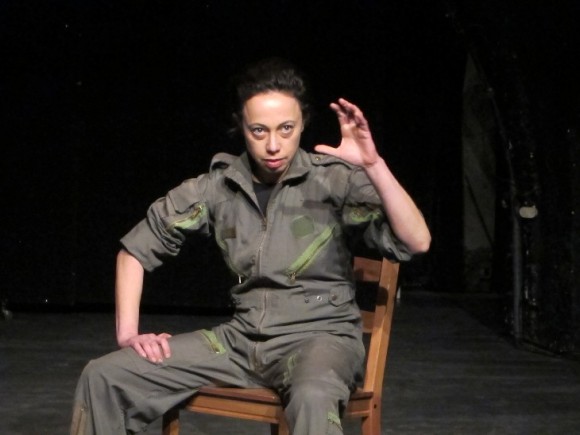
Grounded – by George Brant, translated and performed by Keren Tzur, directed by Sinai Peter, set design by Pancho Idelberg, lighting by Yehiel Orgal, music by Hagi Keshet. The story of an American woman, an F 16 fighter pilot whose unexpected pregnancy alters the course of her life and career. She is reassigned to operate military drones from a trailer outside Las Vegas, after 12 hours a day taking down ‘bad guys’ she returns home to her husband and young daughter. No longer flying in the blue skies, she stares at a gray screen, and the boundaries between the Nevada desert where she makes her home, and the desert she patrols begin to blur. It’s a highly charged play that takes up myriad burning issues, and has received many prizes and accolades.
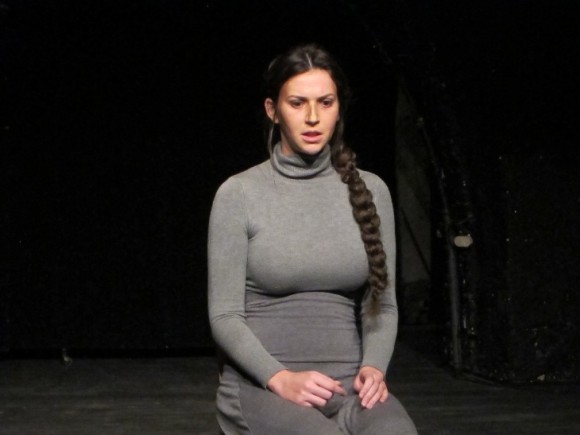
Katerina – based on the novel by Aharon Appelfeld, performed by Avishag Maidler, directed by Lena Pogosov, adaptation by Michael Cherchie. Sentenced to solitary confinement at age 35 for a heinous crime, Katerina receives her first visit from her son, Benjamin. His presence forces her to come to terms with the past. She tries to explain how the daughter of Christian peasants became so closely connected to the Jewish people and their destiny, and how she came to commit the crime. Will he understand and absolve her?
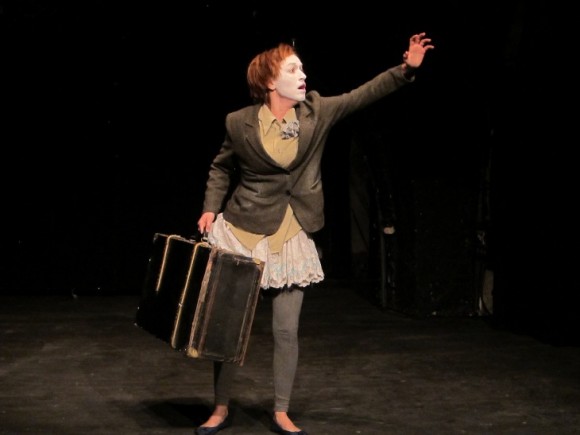
Squiggles – written and directed by Ofir Nahari, performed by Nofar Muati. A clown performance for adults. Chloe’s parents decide to move, despite Chloe’s objections. It’s a stormy winter night and their carriage gets into trouble on the way. Somewhere between the thunder and lightning, Chloe and her suitcase are tossed from the carriage in the midst of the forest. Alone and scared she watches the carriage disappear. Night is falling and she must find shelter. Her only option is the suitcase full of all the things that matter most: her teddy bear, Barbie dolls and the white chalk she uses to draw an entire world on the black suitcase. A meeting place of physical theatre, clowning, gibberish, and object theatre, all seen through the imagination of Chloe, a little girl trying to solve adult problems.

You Can See the Legs – written and performed by Anat Zauberman, dramaturgy by Inna Eizenberg, directed by Miri Lazar. The struggle of a young woman to overcome the demons of addiction that plagued her youth. The play is a parting ritual from those demons, made from the stories of her childhood, dealing with power struggles, the generation gap, drugs, anorexia and first love. The protagonist performs these purification parting rituals with the participation of the audience. Aiding her in this endeavor, and boosting her confidence are music from the 90s, things grandmother used to say, her old toy dog with button eyes, and an ability to rhyme.
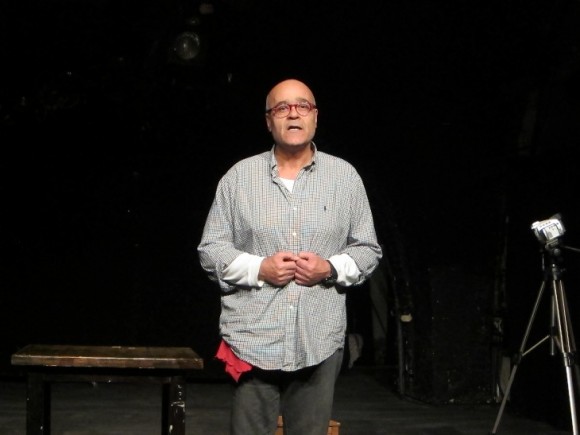
Self Mercy – written and performed by Jonathan Cherchie, directed by Rani Bleier and Jonathan Cherchie. A 59 year old man of the theatre sets the stage for the most important event of his life, a monologue that becomes a pointed and revealing personal document. The stream of consciousness of a mature man who cannot accept that he is aging, and opens his heart before the audience, sharing with them the joys and sorrows of his childhood, the women he has known and loved, and his struggle to hold on to his sanity.
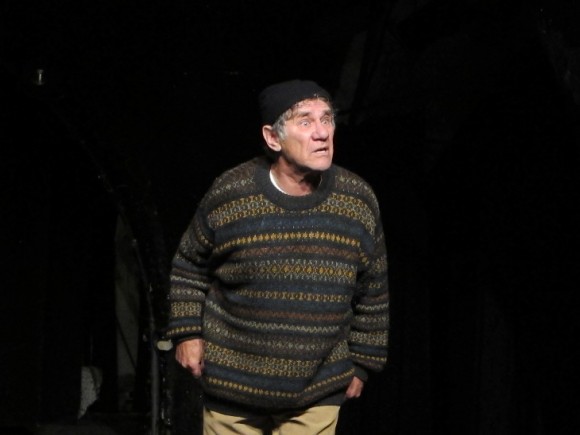
Shetuchal Levad – by Rachel Gill, performed by Avraham Selektar. An elderly man is alone in a room. Two policemen have just left his house and they are waiting for him outside. Why have they come? Why are they waiting, and for whom? The man’s life story is revealed in a touching monologue, telling of his wife and their “special” daughter. It’s the story of their desperate struggle to raise their daughter to be independent, “shetuchal levad” – so that she can do things on her own. But the small measure of independence that she has acquired led to something they had never foreseen.

Roeh Et Hakolot (Sees The Voices) – written and directed by Omer Tadmor, performed by Vladimir Fridman. Avraham Avramov is a very sad psychologist who tries to hide his feelings from his patients, usually without success. That is why they never stay. He has been contending with an overpowering fantasy of committing suicide since an early age, and has many original ideas about how to do the deed. All he lacks is the courage to act. “Luckily” fate has brought him a patient who has the opposite fantasy. 15 year old Noam has been fantasizing about committing murder ever since he was a boy. He does not know who he kills, he does not know why, and he doesn’t really care, he only knows that it will happen. Avramov recognizes Noam’s hidden fantasy and sees his big chance. He uses his knowledge and skills, not to repress Noam’s destructive tendencies or cure him of them, but rather to encourage him to go all the way. Two souls, two extremes of life, stand at the edge and try to find a good reason to remain.
All plays in competition are performed in Hebrew, except Squiggles, which is performed in gibberish.
Tickets may be purchased online at run-art.co.il or call 09-8945957. Tickets are 50 NIS advance purchase/60 NIS at the door. Tickets for international performances are 60 – 80 NIS. Follow Theatronetto on facebook.
The photos were taken at a presentation of brief scenes from each play, more photos on Midnight East’s facebook page in the Theatronetto album.






